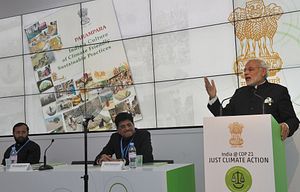India will ratify last year’s Paris agreement on climate change on October 2, Indian Prime Minister Narendra Modi’s office confirmed on Sunday.
Modi, in a speech to members of his party, drew special attention to the date of the signing, which will coincide with Gandhi Jayanti, or the birthday of Mohandas Gandhi, the foremost leader of India’s independence movement.
“Now the time has come to ratify the COP21 protocol. India will do it on Gandhi Jayanti, on October 2,” Modi told members of the Bharatiya Janata Party at a meeting in the southern Indian state of Kerala.
The 21st Conference of the Parties under the United Nations Framework Convention on Climate Change took place last November and December, resulting in the most ambitious international agreement to stem rising global temperatures to date.
The agreement can enter force once 55 countries, representing between them at least 55 percent of global emissions of greenhouse gases, successfully ratify it through their respective legislatures.
China and the United States, the world’s first and second largest emitters, have already ratified the agreement. India is the third largest emitter in absolute terms.
According to the World Resources Institute, India’s signing of the pact will take the agreement past the 52 percent mark in terms of global emitters, bringing it closer into entering force.
Per the agreement reached in Paris last year, India agreed to gradually increase the proportion of its total energy consumption from renewable energy sources.
Delhi further agreed to curb emissions relative to the country’s gross domestic product. India will reduce greenhouse gas emissions by 33 to 35 percent from 2005 levels by 2030.
For India, signing on to the Paris agreement demonstrated an adjustment of its insistence on the climate justice argument, which posited that developed countries were primarily responsible for the sharp increase in global emissions over the 20th century and that emerging economies shouldn’t be penalized in turn for problems that they did not directly cause.
Delhi’s “Intended Nationally Determined Contribution” (INDC) submitted in advance of the Paris conference last year had moderated its old position.

































